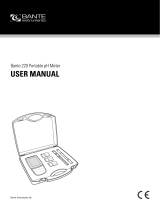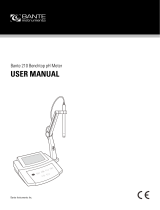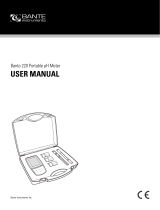2 Points Calibration
2.1 Ensure that you have selected 2 points calibration in the setup
menu.
2.2 Repeat steps 1.2 through 1.4 above. When the first calibration
point is completed, the display will show ---- / . The meter
prompts you to continue with second point calibration.
2.3 Rinse the pH electrode with distilled water, place the electrode
into the next buffer solution (e.g., pH 4.01).
2.4 Press the Enter key, the meter automatically recognizes the buffer
solution and begins the calibration.
.
2.5 When the reading has stabilized, the display will show electrode
slope and . Calibration is completed.
3 Points Calibration
3.1 Ensure that you have selected 3 points calibration in the setup
menu.
3.2 Repeat steps 1.2 through 1.4 above. When the first calibration
point is completed, the display will shows / . The
meter prompts you to continue with second point calibration.
3.3 Rinse the pH electrode with distilled water, place the electrode
into the pH 4.01 buffer solution and stir gently.
3.4 Press the Enter key, the meter begins calibration.
3.5 Wait for the reading to stabilize, the display will show electrode
slope and / (or / ).
3.6 Rinse the pH electrode with distilled water, place the electrode
into the pH 10.01 (or 9.18) buffer solution and stir gently.
3.7 Press the Enter key, the meter begins the calibration.
3.8 Wait for the reading to stabilize, the display will show electrode
slope and . Calibration is completed.
• During the calibration, if the display shows ---- indicating the
meter is waiting for recognizing the pH buffer solution.
• If the display shows indicating the measured mV value for
the current calibration point deviates by more than 60 mV from
the theoretical value of the pH buffer. The calibration will not be
accepted. Please check the pH electrode and ensure the buffer
solutions are fresh and uncontaminated.
• If the calculated electrode slope is not between 70% to 110%,
the pH electrode may need to be replaced.
• To exit the calibration without saving changes, press the
key.
Measurements
pH Measurement
1.1 Press the key until the display shows measurement unit "pH".
1.2 Place the electrode into the sample. Wait for the measurement
to stabilize.
mV Measurement
2.1 Press the key to switch the meter to "mV" mode.
2.2 Place the electrode into the sample. Wait for the measurement
to stabilize.

















